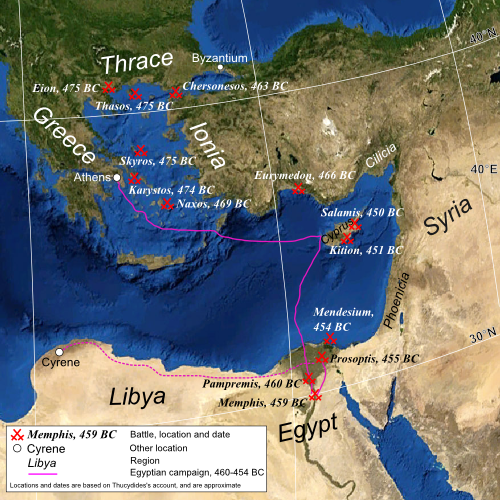In this episode, we discuss the years spanning 454-446 BC, covering Athens' increasingly imperialistic behavior and the final years of the First Peloponnesian War
Synopsis:
Following the disastrous Egyptian expedition, numerous cities from the Delian League revolted, including Erythrae and Miletus. At the same time, a famine rocked Attica. This led the Athenians to change their stance in a significant way. When Cimon returned from his ten years of ostracized exile, he and Pericles reconciled with the understanding that he would lead the army and make war with Persia, while Pericles went about implementing his domestic policies. So a five years’ peace with Sparta was agreed upon, and Cimon led a fleet to Cyprus, where he died while besieging Kition. His fleet, though, trounced the Persian navy on both sea and land near Salamis on Cyprus. This lead to the so-called Peace of Callias, effectively bringing the Persian wars to a close. Athens now began to act as an openly imperial city. A Panhellenic Congress was called by Pericles in which it was decided that money from the league’s treasury will be used to rebuild the temples throughout Attica that had been sacked by the Persians, kicking off the so-called Periclean building program. A considerable number of cities stopped sending tribute, including Colophon and Miletus, and so the Athenians put down their revolts with the use of force. The Athenians also enforced the use of standard Athenian coins, weights, and measures throughout the empire and laid down a strict procedure for the transport of tribute to Athens. Meanwhile, the Spartans engaged in a “sacred war” to remove control of the Oracle of Apollo from the Phocians and give it back to the Delphians and then returning home, along the way spreading anti-Athenian propaganda among the Boeotian cities. Athens responded by taking the oracle away from the Delphians and giving it back to their allies, the Phocians, but they soon found that oligarchic uprisings were happening throughout Boeotia. Tolmades’ army was ambushed and annihilated at Coronea, effectively bringing a collapse to the Athenian Land Empire in central Greece. This defeat, however, triggered rebellions at Megara and Euboea. Sparta sought to take advantage of the situation and the Spartan king, Pleistoanax, marched an army towards Attica. When both sides met near Eleusis, though, Pleistoanax and Pericles had a meeting and then the Spartans marched home. Then, although Megara was lost for good, the Athenians crushed the Euboeans and brought them back into the empire. Upon returning home, Pleistoanax was charged with bribery by the Spartan hawks and his fine was so large that he was forced into exile. However, even if money hadn’t changed hands, the Spartans came to the realization that their exiled king was being wise, and so the Athenians and Spartans agreed to the Thirty Year’s Peace, thus bringing an end to the First Peloponnesian War.
Supplementary Resources (Videos, Photos, Other Podcasts)
Recommended Podcast Episodes:
***History in the Making - Linchpins and Puppeteers
***History in the Making - Ascension



No comments:
Post a Comment